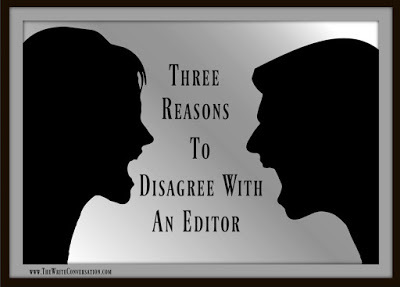3 Good Reasons to Disagree with an Editor
 by Lori Hatcher @LoriHatcher2
by Lori Hatcher @LoriHatcher2Because I’m an editor as well as an author, you might be surprised to read the title of this post. Aren’t editors always right? Won’t you doom your writing career if you disagree with an editor? Won’t they stick the dreaded difficult label on you if you dare to question one of his or her edits?
It’s important to keep in mind that disagreeing is far different than being disagreeable. Your relationship with your editor should be one of mutual give and take, characterized by dialogue and interaction. This is the reason for the Accept and Reject Change button in Microsoft Word—you have the power and right to reject editorial changes, but only for very good reasons. And be prepared to defend yourself.
1. The proposed change is incorrect.Most editors are well versed in grammar, punctuation, and the particular style guide of their publication. No editor, however, can know everything.
One reason to question an edit is the area of local or specific knowledge. For example, in my latest devotional book, Hungry for God … Starving for Time , I refer to my home area as the Sandhills of South Carolina. During the editing phase of my book, my editor lowercased the s in Sandhills.
I rejected her edit and inserted a comment bubble that explained that I wasn’t using the word Sandhills to describe the topography of the region; it was the actual name of the area. To add credibility to my explanation, I inserted a link to a web page of South Carolina geography facts describing the Sandhills region of South Carolina. And yes, the S was capitalized.
Similarly, you may have knowledge about an area, field, or specialty your editor doesn’t. If this impacts an edit, it’s more than OK to explain your reasoning. Documentation adds credibility to your objection.
2. The edit alters your meaning. Sometimes a change in wording or word order will significantly alter your intended meaning. This is a valid reason to oppose an editorial change. For example, you may write, “The club is open to visitors and meets on the first and third Thursdays.” Your editor may think the specifics bog down the flow of the article and change it to “The club is open to visitors and meets every other Thursday.”
You know, however, that because of the way the calendar sometimes falls, there might be a fifth Thursday in a month, making the “every other Thursday” change inaccurate.
If an edit changes the meaning or intent of your words, you must reject it (with an explanation) to maintain the accuracy of your writing.
3. The edit significantly alters your voice. Good editors know that edits should reinforce your voice and style, not change it. If you’re folksy and casual, and you’re writing a whimsical novel about life in the mountains of North Carolina, your editor shouldn’t change your vernacular to sound like an academian. Conversely, if your topic is technical or educational, she’s justified in editing out the y’alls, sistahs and sugahs.
Voice is a tricky thing to pin down, but if you read the piece aloud, and it sounds more like your editor than you, it’s time to politely object.
Keep in mind that editors are not adversaries. Their job is to make writers look good and make your work as clear and effective as possible. While most are knowledgeable and professional, they’re not infallible.
It’s important to remember, however, that while you may be justified in disagreeing with an editor, you’re never justified in being disagreeable. Be polite, respectful, teachable, and professional, and you’ll always have a great relationship with the hardworking editors with whom you work.
TWEETABLE
3 Good Reasons to Disagree with an Editor - @LoriHatcher2 on @EdieMelson (Click to Tweet)
 Lori Hatcher is the editor of
Reach Out, Columbia
magazine and the author of two devotional books,
Hungry for God … Starving for Time, Five-Minute Devotions for Busy Women
and Joy in the Journey – Encouragement for Homeschooling Moms. A blogger, writing instructor, and women’s ministry speaker, her goal is to help women connect with God in the craziness of life You’ll find her pondering the marvelous and the mundane on her blog, Hungry for God. . . Starving for Time . Connect with her on Facebook, Twitter (@LoriHatcher2), or Pinterest (Hungry for God).
Lori Hatcher is the editor of
Reach Out, Columbia
magazine and the author of two devotional books,
Hungry for God … Starving for Time, Five-Minute Devotions for Busy Women
and Joy in the Journey – Encouragement for Homeschooling Moms. A blogger, writing instructor, and women’s ministry speaker, her goal is to help women connect with God in the craziness of life You’ll find her pondering the marvelous and the mundane on her blog, Hungry for God. . . Starving for Time . Connect with her on Facebook, Twitter (@LoriHatcher2), or Pinterest (Hungry for God).
Published on August 26, 2016 01:00
No comments have been added yet.



